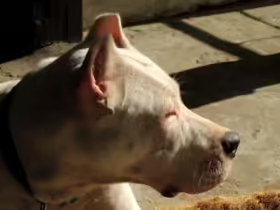Have you ever caught your dog munching on grass during a walk or in the backyard? If so, you’re not alone. Many dog owners have noticed this curious behavior and wondered what it means. While it may seem strange or concerning, eating grass is a common behavior among dogs. This blog will explore the reasons why dogs eat grass, whether it’s something to worry about, and what you can do about it.
1. Is Eating Grass Normal for Dogs?
Yes, eating grass is a relatively normal behavior for dogs. Studies suggest that a significant percentage of dogs occasionally consume grass, and this behavior is not usually a sign of a severe issue. However, understanding the reasons behind this behavior can help you ensure your dog’s health and well-being.
2. Reasons Why Dogs Eat Grass
There are several theories about why dogs eat grass. These theories range from natural instincts to potential health needs. Here are some of the most common reasons:
a. Natural Instincts
Dogs are descendants of wild canines, like wolves and foxes, who are known to consume grass and other vegetation in the wild. This behavior is thought to be a natural instinct that has carried over into domestic dogs. In the wild, consuming grass might have provided roughage and helped with digestion.
b. Dietary Needs and Nutritional Deficiencies
Some experts believe that dogs may eat grass to compensate for a nutritional deficiency, particularly fiber. Grass provides roughage that may aid in digestion and improve gastrointestinal health. If your dog’s diet lacks sufficient fiber or certain nutrients, they may instinctively eat grass to fill that gap.
c. Boredom or Anxiety
Dogs may eat grass out of boredom or anxiety. If a dog does not have enough physical exercise or mental stimulation, they might turn to eating grass as a way to pass the time or cope with stress. This behavior is more common in dogs that are left alone for long periods or those that do not get enough playtime.
d. To Induce Vomiting
Some dogs eat grass to induce vomiting, especially if they feel unwell or have an upset stomach. Grass blades can irritate the stomach lining, which might cause the dog to vomit. This can be a dog’s way of self-medicating to get rid of something in their stomach that is causing discomfort.
e. Enjoyment or Taste
Sometimes, dogs eat grass simply because they enjoy it. Some dogs might like the taste or texture of grass. Just as humans have different tastes and preferences, so do dogs, and some may just enjoy munching on grass occasionally.
3. Is Eating Grass Harmful to Dogs?
In most cases, eating grass is not harmful to dogs. However, there are a few considerations to keep in mind:
- Pesticides and Chemicals: Grass that has been treated with pesticides, herbicides, or fertilizers can be toxic to dogs. Ensure that any grass your dog has access to is free from these harmful chemicals.
- Sharp Grass Types: Some types of grass have sharp edges that can cause irritation or injury to a dog’s mouth or digestive tract. If you notice bleeding or discomfort, consult your vet.
- Underlying Health Issues: If your dog eats grass frequently and shows signs of gastrointestinal distress, such as vomiting, diarrhea, or lethargy, it might indicate an underlying health issue that needs veterinary attention.
4. How to Manage Grass Eating in Dogs
If you are concerned about your dog eating grass or want to prevent it, there are several steps you can take:
a. Provide a Balanced Diet
Ensure your dog is getting a balanced diet that meets all its nutritional needs. High-quality commercial dog foods are formulated to provide the essential nutrients dogs need. You can also consult your vet about adding fiber-rich foods to your dog’s diet to ensure they are getting enough roughage.
b. Increase Physical and Mental Stimulation
Boredom and anxiety are common reasons dogs eat grass. Make sure your dog gets enough exercise, playtime, and mental stimulation throughout the day. This could include daily walks, play sessions, interactive toys, or even training exercises.
c. Supervise Outdoor Activities
Supervise your dog when they are outdoors to prevent them from eating grass, especially in areas where you are unsure of the grass’s safety. This is particularly important in public parks or neighborhoods where grass may be treated with chemicals.
d. Offer Safe Alternatives
If your dog enjoys chewing, provide safe alternatives like chew toys or treats specifically designed to be chewed on. You can also consider growing a small herb garden with dog-safe plants like wheatgrass, which dogs can safely munch on.
e. Consult Your Veterinarian
If you are worried about your dog’s grass-eating behavior or notice any signs of illness, consult your veterinarian. They can help determine if there is an underlying health issue that needs to be addressed or if your dog’s diet requires adjustments.
5. When to Be Concerned About Grass Eating
While occasional grass eating is generally not a cause for concern, there are situations where you should be more vigilant:
- Frequent Vomiting: If your dog regularly eats grass and vomits afterward, it might indicate a gastrointestinal issue or another health problem that requires veterinary attention.
- Excessive Grass Eating: If your dog is constantly eating grass, it could suggest a behavioral issue, such as anxiety, or a nutritional deficiency.
- Other Symptoms of Illness: If grass eating is accompanied by other symptoms such as diarrhea, lethargy, loss of appetite, or weight loss, it’s time to consult your vet.
Conclusion
Grass eating is a common behavior among dogs and is usually not a cause for alarm. It could be due to natural instincts, boredom, dietary needs, or simply a preference for the taste and texture of grass. However, if your dog’s grass eating is frequent or accompanied by signs of illness, it’s essential to consult your veterinarian to rule out any underlying health issues. By understanding the reasons behind this behavior and taking appropriate steps, you can ensure your dog remains happy and healthy.











Leave a Reply